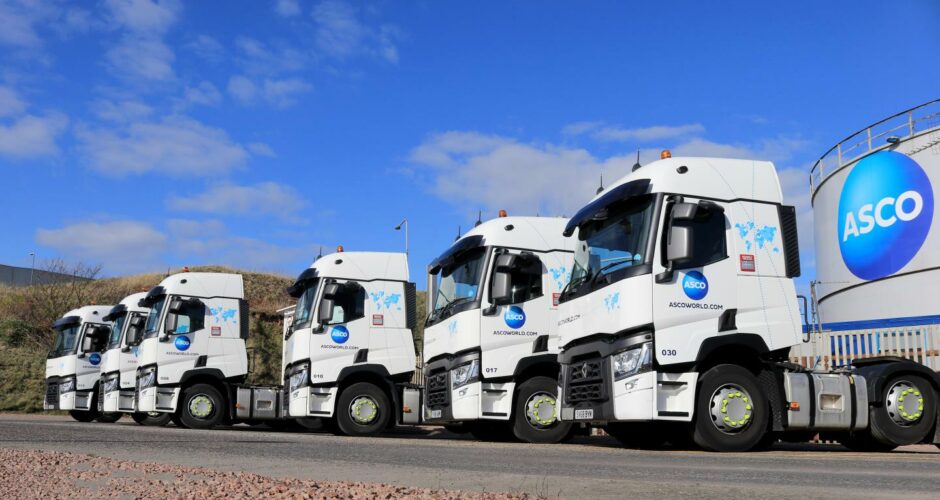
Asco is switching its heavy goods vehicle fleet from fossil fuel to vegetable oil-based renewable diesel from this month.
The change is part of the global logistics and materials management company’s commitment to reducing carbon emissions – it aims to be net-zero by 2040.
Aberdeen-based Asco said its switch to hydrotreated vegetable oil (HVO) – a form of renewable diesel that’s been synthesised from renewable and sustainably sourced fats and oils – would reduce direct carbon emissions from its business by more than 3,040 tonnes.
This equates to a 46% cut in the UK and a 20% reduction across Asco’s global operations against its 2019 baseline.
Asco said the 3,040 tonnes of CO2 saved was equivalent to the amount absorbed by 150,586 trees in one year or the volume produced by heating 453 homes in a year.
HVO is a biofuel made from industrial waste and non-food crops.
It can be used as a drop-in replacement for diesel in the transition to low-carbon fuel alternatives.
Asco’s fleet of around 100 vehicles will be using a 100% biofuel that is produced from non-food crops, ensuring the biomass is not in direct competition with food growth.
Having completed a successful field trial using HVO in July 2021, the project has received original equipment manufacturer approval and is being rolled out across the UK this month.
Asco said its efforts to reduce its carbon footprint also meant fewer emissions for clients.
Mick Smith, UK fleet manager, Asco, said: “In addition to reducing greenhouse gas emissions in our own operations, Asco is committed to making changes that also impact on shaping a low-carbon supply chain.
“Over the last eight months we have been exploring ways to improve our environmental footprint by switching to low-carbon alternatives.
“As technology advances we want to use new innovations to ensure we take the right action to tackling climate change, whilst continuing to deliver for our clients without disruption.”
Mr Smith added: “Achieving our net-zero carbon targets requires collaboration throughout the supply chain.
“With the support of our clients, we can work towards decarbonising our operations and support the industry to deliver a sustainable future.”
Asco said its switch to HVO allowed it to go beyond the requirements of the Aberdeen Low Emissions Zone, which comes into effect later this year.
Asco has risen from humble beginnings in a small warehouse in Aberdeen, in 1967, to a company turning over hundreds of millions of pounds annually.
London-based DH Private Equity Partners sold the company at the end of 2020 to a consortium of investors, trading as Zander Topco, for an undisclosed sum.
According to documents filed at Companies House, the sole shareholder of Zander Topco is Crestbridge Nominees – a subsidiary of London-based fund, trust and corporate services provider Crestbridge, whose own parent is a company registered in Jersey.
Zander Topco’s directors include Asco chief executive Peter France, oil and gas veteran Bob Keiller – who joined Asco as chairman when it changed hands – and ex Sparrows Group boss Doug Sedge.